| Name: | Ambien (generic Zolpidem) |
| Dosage: | 10mg |
| Best price per unit: | $2.85 |
| Recommended pharmacy to buy Ambien: | ORDER AMBIEN ONLINE HERE |
Ambien, a popular prescription medication for treating insomnia, has become increasingly accessible through online pharmacies. These digital platforms offer convenience and potential cost savings for those seeking relief from sleep difficulties. Zolpidem, the generic form of Ambien, is often available at lower prices than brand-name versions.
While online purchasing can be appealing, it’s crucial to exercise caution. Legitimate online pharmacies require valid prescriptions and are licensed to dispense medications. Patients should be aware of potential side effects, including dizziness, daytime sleepiness, and an increased risk of falls, particularly in older adults.
Ambien is typically prescribed for short-term use due to its potential for dependency. Those considering buying Ambien online should consult with a healthcare provider to ensure it’s the appropriate treatment for their sleep issues and to discuss proper usage and dosage.
Ambien Price: Order generic Zolpidem online
The cost of Ambien varies significantly depending on factors such as dosage, quantity, and whether one opts for the brand name or generic version.
The average retail price for Ambien (brand name) is around $2,272 for a supply of 100 tablets at 5 mg strength, while the generic version, zolpidem, can be obtained for as low as $7.61, which is 87% off the average retail price of $60.03 for the most common version. This stark difference in pricing highlights the potential savings available to consumers who choose generic alternatives.
For those concerned about affordability, various options exist to reduce out-of-pocket expenses. These include insurance coverage, pharmacy coupons, and patient assistance programs. Additionally, extended-release versions like Ambien CR may be available at discounted rates, with prices as low as $17.22 using certain discount programs.
Ambien Prescription
Ambien prescriptions have increased over the last decade due to rising cases of insomnia. People often seek it as a less-harmful replacement for benzodiazepines. However, Ambien can be just as addictive as benzos. Ambien and alcohol can also have dangerous interactions that people often overlook.
What is Ambien?
Ambien is the brand name for the “z-drug” zolpidem. Other well-known Z-drug is Zopiclone (generic Imovane) which is especially popular in the UK. Here you can learn where to buy Zopiclone online safely in the United Kingdom. Doctors primarily prescribe it to treat moderate to serious insomnia in patients who do not need benzodiaznepine prescriptions. In other words, if the only symptom appears to be insomnia, the patient will likely get ambien. Ambien was designed to be a safer and less addictive version of common benzos previously used to relieve insomnia. However, an addiction can develop if patients overuse or abuse the medication.

Ambien works similar to most benzos by activating gamma-aminobutyric acid (GABA) in the brain. GABA is a neurotransmitter which blocks impulses between the brain and nerves. In a general sense, GABA slows down the brain and nervous system. This can help individuals who have trouble sleeping due to anxiety or mood disorders. It can also create a sedative, almost ‘frozen’ state which is appealing to some people.
Ambien can also have several negative side effects such as ‘rebound insomnia,’ where the individual will have difficulty falling asleep without taking the drug. Other side effects include:
- Drowsiness
- Dizziness
- Weakness
- Loss of coordination
- Headache
- Muscle pain
- Insomnia
- Euphoric high
- Memory loss
- Confusion
Why is Ambien Dangerous?
When compared to other drugs that are commonly associated with addiction, ambien is not one that many people think of as dangerous. However, the perception that ambien is simply a sleep aid akin to melatonin is what makes it dangerous. Many people take ambien with little to no thought of the possibility of addictio. They may also forget they have taken it and proceed to consume alcohol or other drugs. In fact, the DEA has listed ambien in the same category as xanax, valium and tramadol.
Can you Overdose on Ambien?
When considering the dangers of any sedative drug, the potential for overdose is always present. However, ambien is chemically very dissimilar to other depressive drugs such as benzos or opiates. While not impossible, it is very difficult to overdose on ambien.

How Alcohol Interacts with Medications Like Ambien
While most people have a general understanding of alcohol and how it works, it’s important to understand the full effect it has on the brain and how it can interact with other substances. Alcohol is a central nervous system depressant not unlike opioids or benzodiazepines. It is also the most popular drug in the world due to its social utility.
Like Ambien, alcohol and other CNS depressants work by binding to and activating GABA neurotransmitters in the brain. This results in brain and nerve function slowing down. Depressants cause critical nerve systems and motor abilities to slow as well. If someone consumes too much alcohol, its depressive effects can overwhelm the CNS, causing breathing to slow or stop.
Not all overdoses are lethal. However most do create long-term or permanent damage to the brain and body due to the lack of oxygen.
What Happens When you Mix Ambien and Alcohol?
Understanding that both substances create depressive effects on the brain and body can provide insight on why the two drugs shouldn’t be combined. Generally speaking, combining two or more drugs will enhance the side effects of both drugs. While an ambien-alcohol combination may not depress the nervous system to the point of overdose, the greater risk lies in the potential for engaging in dangerous behavior while under the influence. When taking ambien, drinking and driving is even riskier than it would be otherwise. Further, ambien can make it hard to estimate how much alcohol is too much. For example, let’s say you know your limit is two beers before you are unfit to drive. If recently taken ambien, and one beer may be enough to make you seriously intoxicated. However, you may believe that you are fine since it was ‘just’ two beers and proceed to drive.
Additionally, there is always the possibility that an altered and sedated state of mind will cause someone to take more ambien or consume more alcohol. Regardless, mixing ambien and alcohol can cause serious intoxication and impair judgement.

How Long Does Ambien Stay in Your System?
The speed at which a substance metabolizes is heavily influenced by several factors. These can include age, sex, gender, genetics, and body composition. That being said, you can generally expect ambien to remain in the body 24-48 hours after last ingestion when tested via urine sample. Ambien has a very short half-life of 2.5 hours. In other words, it would take 2.5 hours for 10mg of ambien to effectively become 5mg in the body.
Getting Help for Ambien and Alcohol Abuse
In many cases, Ambien is just as addictive as the benzodiazepines it was designed to replace. While it has real medical uses, it can become dangerous when taken in high doses or mixed with other drugs. It is especially harmful if it becomes a necessary supplement to your daily life. While taking any medication, it is important that your mental health needs are also considered. Many drug dependencies form from mental health disorders which need to be treated as well in order to ensure life-time sobriety. If you or a loved one is struggling with addiction, please contact us today.
